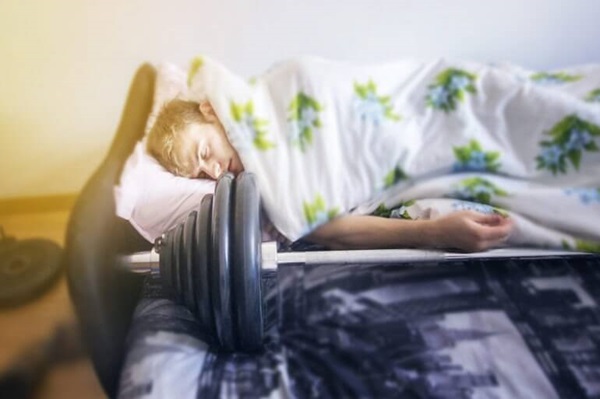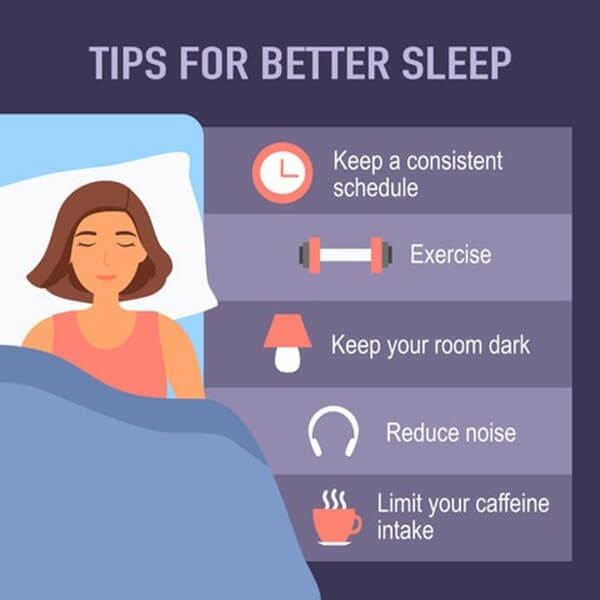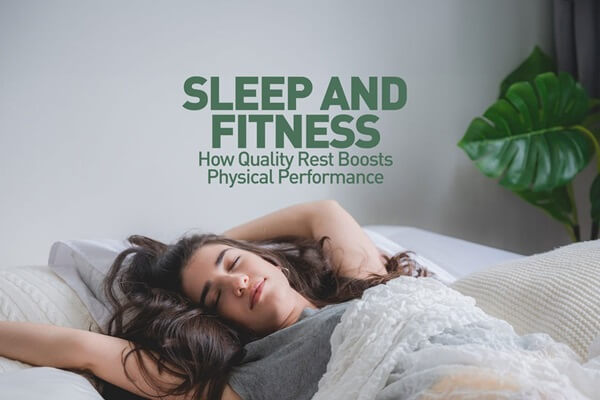Fitness and sleep influence each other in a mutually reinforcing manner. For better performance and recovery, adequate sleep is necessary. Adequate sleep helps the body repair and rebuild tissues, consolidates memories, and releases hormones that promote muscle growth and repair.
In our journey towards better fitness and health, the amount and quality of sleep we get each night play an integral role. Many beginners in fitness focus on the intensity of their workouts, the quality of their nutrition, and the consistency of their training routines but negligence their sleep quality which leads to their slow muscle recovery.
In this article, we will talk about the importance of sleep for optimizing performance, the impact of poor sleep on fitness goals, and practical tips for enhancing sleep quality to maximize your results.
The Importance of Sleep for Fitness Goals
Sleep is a dynamic process during which our body repairs, rejuvenation, and growth. If you are planning to join fitness, remember our body needs proper sleep for muscle recovery from the day’s workouts, tissue repair, and hormones essential for muscle growth and fat loss.
Studies have demonstrated that athletes who give importance to getting enough sleep tend to perform better in terms of reaction time, speed, accuracy, and overall performance.

Furthermore, sufficient sleep enables the body to recover from the physical stress caused by exercise, reducing the risk of injury and enhancing exercise efficiency.
Sleep plays an important role when it comes to fitness in several key areas:
-
Muscle Recovery and Growth
Our muscles get tears in small parts every time we push our bodies through a workout. These tears are normal in the muscle-building process. Sleep ensures that our muscles have enough time to repair and grow stronger which allows us to perform better in subsequent workouts.

Hormonal regulation is also one of the key mechanisms through which sleep influences muscle recovery and growth. During the deep sleep stage, our body releases essential hormones that play a significant role in muscle repair and growth.
Similarly, during sleep, testosterone, an androgen hormone, is also released which is essential for protein synthesis and muscle repair, contributing to muscle growth and recovery processes.
To ensure adequate time for muscle repair and growth, aim for 7 to 9 hours of uninterrupted sleep per night.
-
Hormonal Balance
Sleep is important to regulate key hormones involved in fitness and body composition. Growth hormone, which helps muscle repair and growth, is primarily discharged during deep sleep. On the contrary, insufficient sleep interrupts the balance of hormones like cortisol, the stress hormone, which can lead to increased fat storage and muscle breakdown.
Moreover, the Melatonin hormone which is often referred to as the “sleep hormone,” regulates the sleep-wake cycle. Melatonin provides a signal to the body that it’s time to rest. This hormone level often rises in the evening in response to darkness, promoting drowsiness and preparing the body for sleep.
-
Cognitive Function
Well, fitness is not just about physical strength it also needs mental prowess. Optimal cognitive function helps to maintain proper form during workouts, make smart nutritional choices, and stay motivated.

However, lack of proper sleep can impair cognitive function, affecting everything from reaction time to decision-making abilities, ultimately hampering your fitness progress.
-
Energy Conservation
Adequate sleep helps to restore energy by reducing metabolic rate and allowing the body to enter a state of rest and repair. This restoration of energy helps the body to perform physical activity and maintain optimal performance during waking hours. However, inadequate sleep can cause fatigue, decreased motivation, and reduced exercise performance.
The Impact of Poor Sleep on Fitness Goals: Why Quality Rest Matters
Poor sleep can have a profound impact on our fitness journey. Poor sleep can hinder our ability to obtain our goals and perform at our best.

-
Decreased Exercise Performance
Insufficient sleep can cause a decrease in exercise performance due to fatigue, reduced motivation, and impaired coordination. Without proper rest, you cannot work with full intensity.
-
Impaired Recovery
As we already mentioned sleep is crucial for muscle repair and recovery, poor sleep can prolong the recovery process, leading to persistent muscle soreness, increased risk of injury, and suboptimal gains in strength and muscle mass.
Our body cannot adapt to the physical demands of exercise without proper rest.
-
Increased Risk of Injury
Lack of sleep can harm your coordination, reaction time, and decision-making abilities, which can increase the likelihood of accidents and injuries during exercise. Additionally, inadequate sleep can weaken your immune system, making you more vulnerable to illness and injury and further disrupting your workout schedule.
-
Impaired Cognitive Function
Inadequate sleep can lead to impaired cognitive function, including memory, decision-making, and concentration. This can affect your ability to plan and adhere to your fitness regimen, make healthy food choices, and stay motivated to pursue your goals.

Tips for Better Sleep
As we have already talked about the importance of sleep for fitness. Now, let’s explore some practical tips to optimize sleep quality and quantity:
-
Prioritize Sleep Hygiene
You can make a sleep-friendly environment by keeping your bedroom cool, dark, and quiet. Purchase a comfortable mattress and pillows that allow your body and promote restful sleep. Set a relaxing bedtime routine to signal to your body that it’s time to wind down.

-
Watch Your Caffeine Intake
Having a cup of coffee in the morning can give you the energy boost you need to power through your workout. However, it is important to limit your caffeine intake and avoid consuming it too late in the day as it can interfere with your sleep. It is recommended to avoid drinking caffeine in the afternoon and evening to ensure it does not disrupt your sleep.
-
Watch Your Diet
It’s important to be mindful of your eating habits, especially before bed. Avoid consuming heavy or spicy meals that can cause discomfort and disrupt your sleep. Instead, choose light and easily digestible snacks if you’re hungry.
Frequently Asked Questions
Why is sleep important for fitness and athletic performance?
Sleep is crucial for fitness and athletic performance because it plays a key role in muscle recovery, energy restoration, hormonal balance, and cognitive function. Without adequate rest, the body’s ability to recover, perform, and adapt to training stimuli diminishes, ultimately hindering progress toward fitness goals.
Can lack of sleep affect muscle recovery and growth?
Yes, inadequate sleep can weaken muscle recovery and growth. During sleep, the body releases growth hormones and facilitates muscle repair processes. Without proper rest, the body’s ability to repair and rebuild muscle tissue is compromised, leading to decreased muscle growth and recovery.
